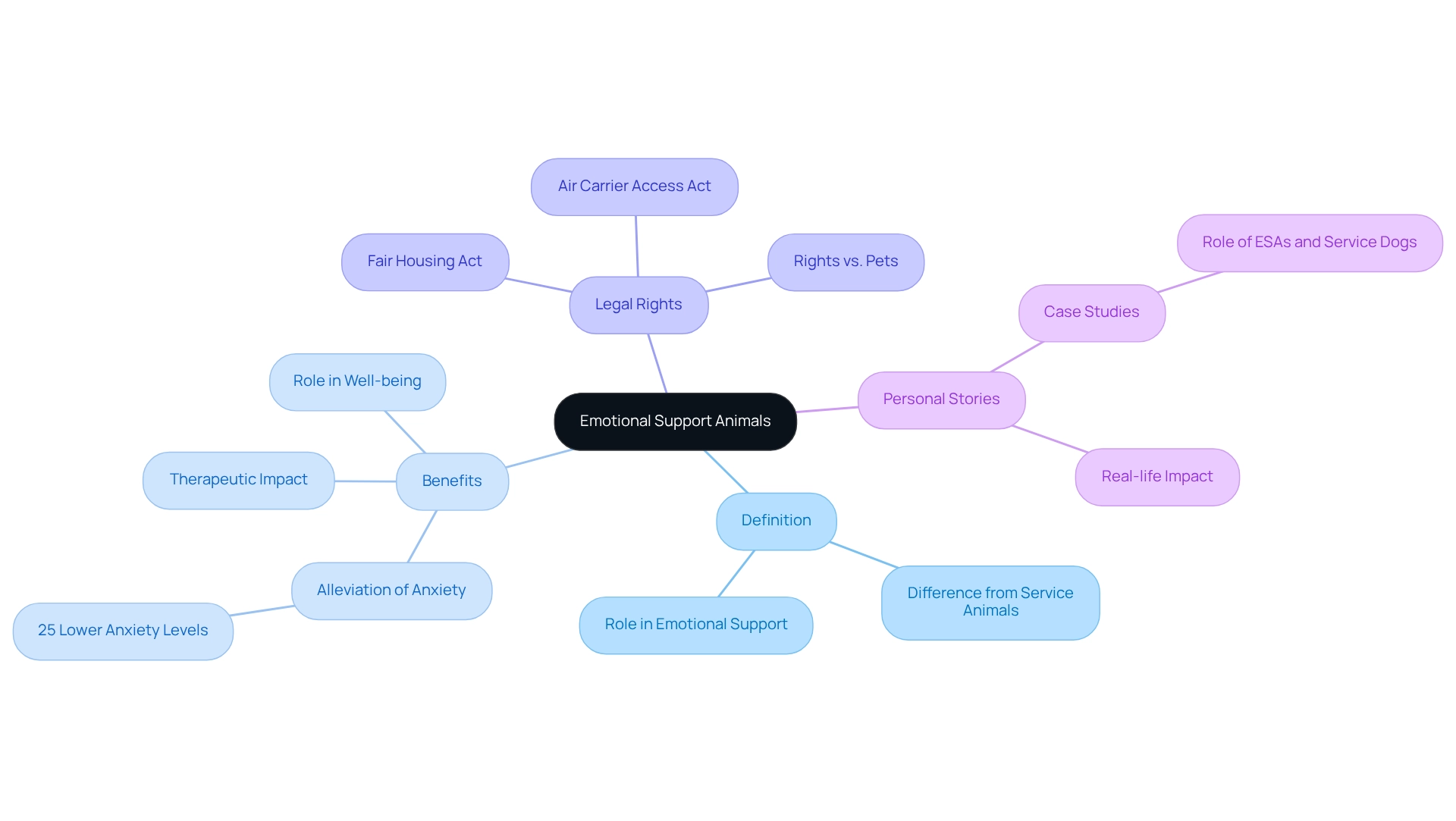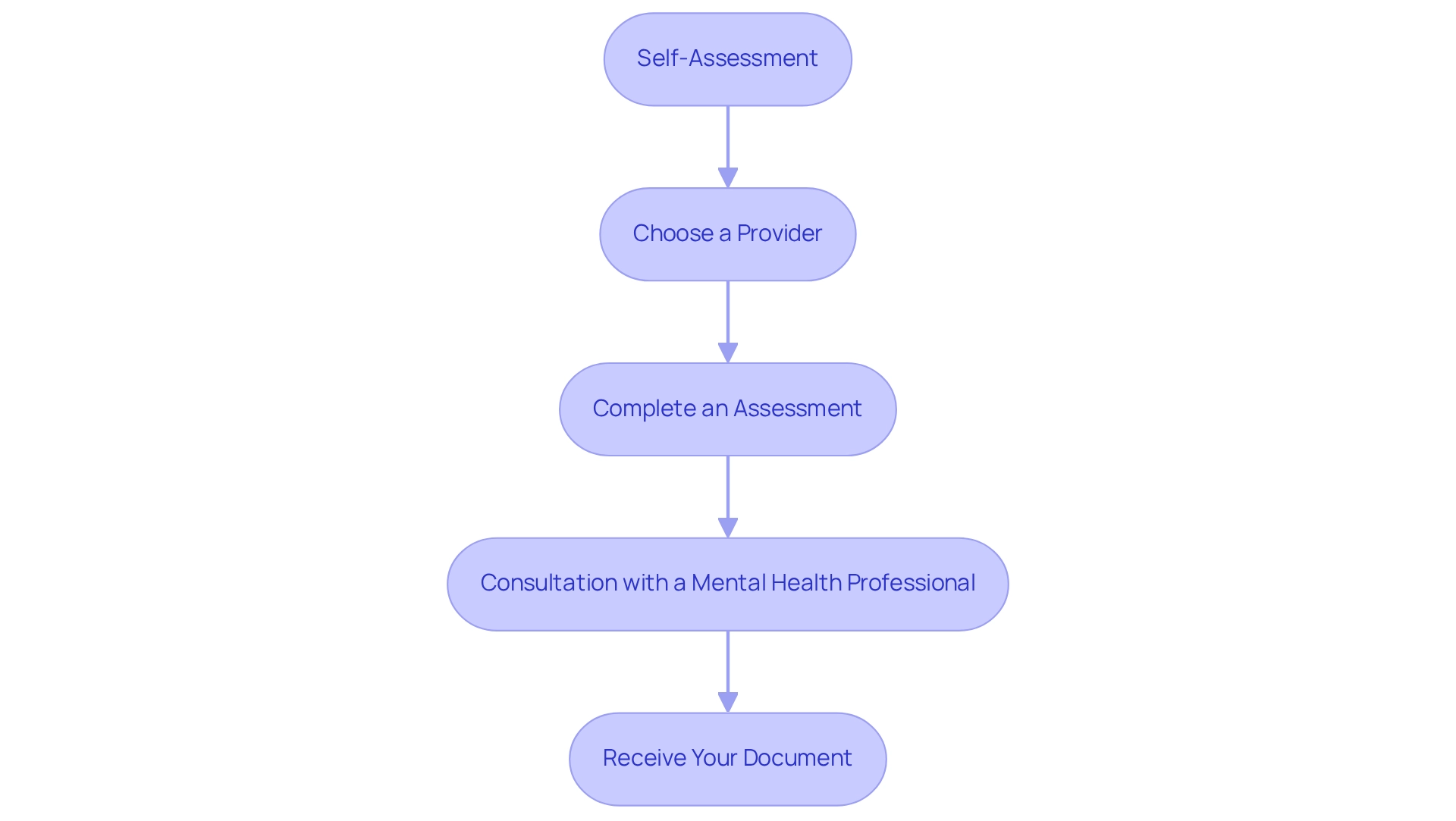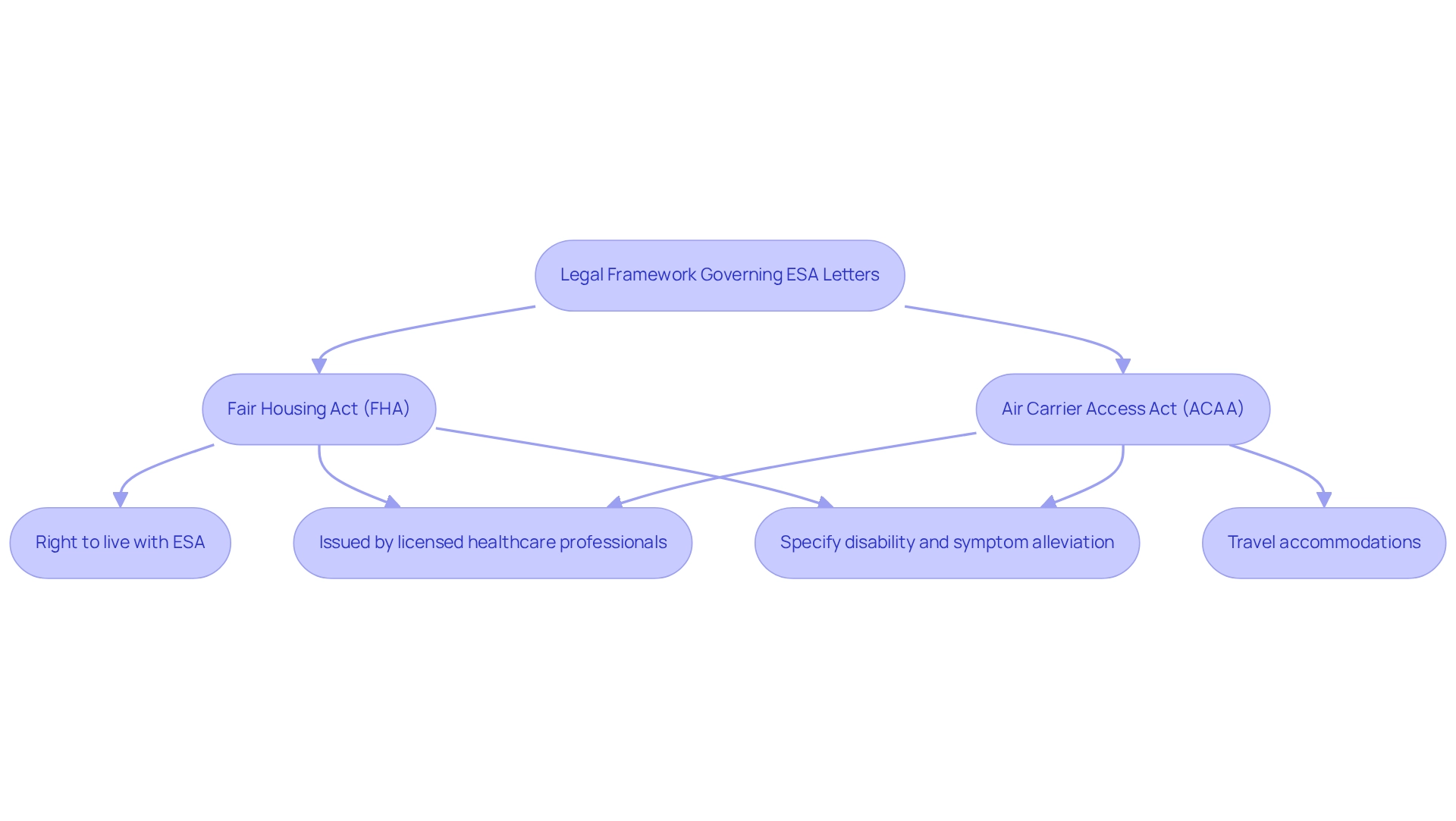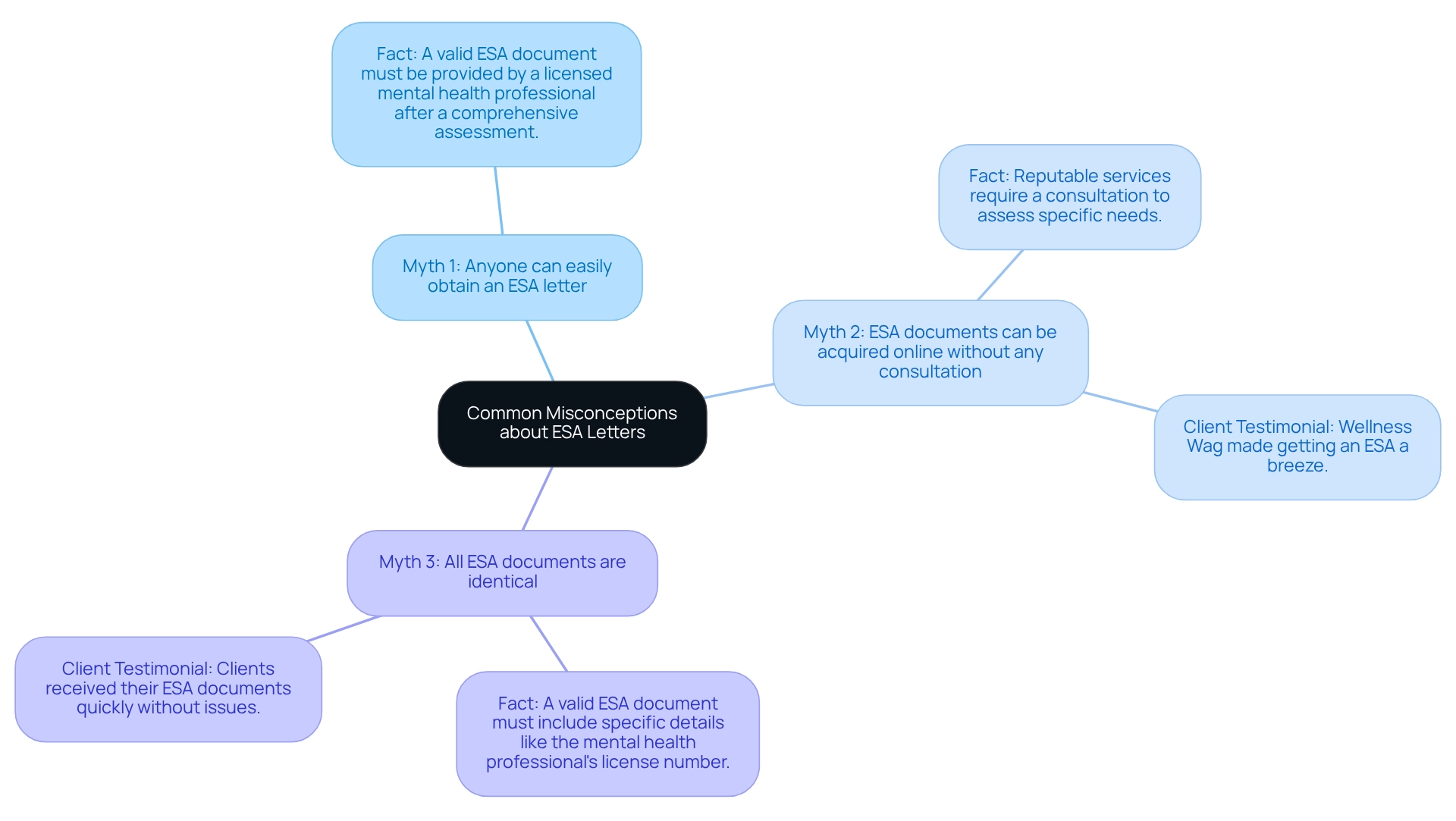Overview
Navigating the journey to obtain a legitimate Emotional Support Animal (ESA) letter can feel overwhelming for many. Individuals often face emotional challenges that can weigh heavily on their well-being. To find relief, it’s essential to follow a structured process that includes:
- Self-assessment
- Selecting a reputable provider
- Completing an assessment
- Having a compassionate consultation with a licensed mental health professional
Ultimately, this leads to receiving the necessary document that validates the support you deserve.
It is crucial to ensure that the ESA letter is issued by licensed professionals, as this not only meets legal standards but also safeguards your rights in housing and travel situations. Knowing that there are professionals who understand your needs and can provide the support you seek can be incredibly reassuring. Remember, you are not alone in this journey; there is help available to guide you towards the emotional support you need.
Introduction
In a world that is becoming increasingly aware of the importance of mental health, many individuals face emotional and psychological challenges that can feel overwhelming. For those navigating these difficulties, Emotional Support Animals (ESAs) can serve as invaluable companions, offering comfort and companionship during tough times. Unlike service animals, which are trained to perform specific tasks, ESAs provide a unique source of solace that can significantly alleviate symptoms of anxiety, depression, and PTSD.
As the demand for these supportive animals continues to rise, understanding the process of obtaining a legitimate ESA letter becomes crucial for anyone seeking to enhance their well-being. This article explores the role of ESAs, the legal frameworks that protect their owners, and addresses common misconceptions that can lead to scams, ultimately providing a comprehensive guide to navigating the complexities surrounding Emotional Support Animals.
You are not alone in this journey; there is support available to help you find the companionship and comfort you deserve.
Define Emotional Support Animals and Their Role
Emotional Support Animals serve as vital companions for those navigating emotional or psychological challenges. Unlike service animals, which are specially trained to perform specific tasks for individuals with disabilities, emotional support animals primarily offer companionship and emotional comfort. They play a significant role in alleviating symptoms associated with anxiety, depression, PTSD, and other psychological hurdles, fostering a sense of security and unconditional love.
Research underscores the profound benefits of emotional support animals, revealing that individuals with secure attachments to their pets report anxiety levels that are 25% lower. This highlights the therapeutic impact these animals can have on emotional well-being. Furthermore, experts emphasize the growing need for educational support assistants in our post-pandemic world, where resources for well-being are more crucial than ever. Psychological health professionals affirm the essential role emotional support animals play in meeting individuals’ emotional needs, and understanding the distinction between emotional support animals and service animals is vital for those seeking legitimate esa letters.
Service animals, such as Labrador Retrievers, Golden Retrievers, German Shepherds, and Poodles, are trained to assist with specific tasks and have legal rights to access public spaces under the ADA. In contrast, emotional support animals are recognized for their ability to provide comfort and emotional relief without the same level of training. This understanding is crucial for individuals advocating for their rights under the Fair Housing Act and the Air Carrier Access Act, which afford emotional support animals specific housing and travel privileges that ordinary pets do not enjoy.
Real-life stories further illustrate the positive effects of emotional support animals on psychological well-being. Many individuals have shared how their emotional support animals have alleviated feelings of anxiety and depression, underscoring the significance of these companions in their lives. As the reliance on legitimate esa letters continues to grow, it becomes increasingly clear that they are essential in psychological health care, addressing barriers related to housing and travel regulations while enhancing the quality of life for those in need.
Outline the Process for Obtaining a Legitimate ESA Letter
To obtain a legitimate ESA letter, it’s important to take a few thoughtful steps that can help you on your journey toward emotional support:
-
Start with a Self-Assessment. Reflect on your psychological health needs to determine if an Emotional Support Animal (ESA) could provide the therapeutic benefits you seek. Understanding how ESAs can alleviate symptoms associated with mental health conditions is essential.
-
Next, Choose a Provider. It’s vital to select a reputable online service or a local health care professional who specializes in ESA letters. Wellness Wag offers a streamlined process with licensed professionals who truly understand the importance of emotional support in your life.
-
Then, Complete an Assessment. You’ll need to fill out a brief questionnaire designed to assess your eligibility for an ESA. This initial step is crucial for understanding your specific needs and ensuring that the ESA can effectively support your well-being.
-
Following that, schedule a Consultation with a licensed mental health professional, which can often be done via telehealth. This consultation is a vital opportunity to discuss your situation and receive tailored advice, ensuring the process aligns with your emotional support needs.
-
Finally, you will Receive Your Document. If approved, you can typically expect to obtain your ESA document within 24 hours. Make sure that it includes essential details such as your name, the professional’s credentials, and a clear statement of your need for an ESA.
Statistics indicate that the average time to obtain an ESA document from providers like Wellness Wag is less than a week, highlighting the efficiency of the process. With the increasing demand for emotional support animals, especially during challenging times, understanding how to acquire legitimate ESA letters is more crucial than ever. Experts emphasize that emotional support animals play a significant role in assisting individuals with mental health challenges. One Longmont resident shared, “She’s helped me feel more grounded and less anxious,” which beautifully illustrates the emotional benefits of having an ESA. Moreover, it’s important to recognize that ESAs are a uniquely American phenomenon, reflecting a growing reliance on animals for emotional support and the need for clearer regulations and understanding of their roles.
Explain the Legal Framework Governing ESA Letters
Navigating the complexities of mental health can be incredibly challenging. For many individuals, emotional support animals (ESAs) provide a vital source of comfort and companionship. ESA documents are governed by important laws, particularly the Fair Housing Act (FHA) and the Air Carrier Access Act (ACAA), which are designed to support those who rely on their animals for emotional well-being. Under the FHA, individuals with a valid ESA letter have the right to live with their emotional support animal in housing that typically restricts pets. This legal framework is essential for those facing mental health challenges, as it allows them to maintain their therapeutic relationships with their animals in environments that would otherwise be prohibitive.
Similarly, the ACAA extends protections for air travel, allowing individuals to bring their emotional support animals aboard flights. However, it’s important to understand that while ESAs enjoy these housing and travel accommodations, they do not have the same public access rights as service animals, which are trained to perform specific tasks for individuals with disabilities.
To ensure compliance with these regulations, it is crucial that legitimate ESA letters are current and issued by licensed healthcare professionals, including social workers, physician assistants, nurse practitioners, psychiatrists, or psychologists. These legitimate ESA letters must specify the individual’s psychological or emotional disability and explain how the animal alleviates their symptoms, thereby meeting the criteria established by federal and state regulations.
As you navigate these processes, consider how keeping a calm and neutral tone when interacting with landlords can greatly assist in resolving any disputes concerning emotional support animals. As we look ahead to 2025, the legal protections under the FHA continue to evolve, reinforcing the rights of ESA owners. Understanding these legal frameworks is vital for ESA owners to effectively advocate for their rights and ensure they can benefit from the companionship of their emotional support animals. As Jonalyn Dionio noted, “The data shows a growing reliance on ESAs and service dogs, highlighting their vital role in mental health care and public well-being.
Identify Common Misconceptions and Avoid ESA Letter Scams
Misunderstandings regarding Emotional Support Animal (ESA) documentation can lead to confusion, leaving individuals vulnerable to potential scams. It’s essential to address some prevalent myths and the corresponding facts to provide clarity and support.
Myth 1: Anyone can easily obtain an ESA letter.
Fact: A valid ESA document must be provided by a licensed mental health professional after a comprehensive assessment of the individual’s needs. This process not only ensures the document’s validity but also guarantees that it adheres to legal standards, providing peace of mind.
Myth 2: ESA documents can be acquired online without any consultation.
Fact: Reputable services, like Wellness Wag, require a consultation to assess your specific needs. This crucial step ensures that the ESA document is tailored to your situation and meets the necessary legal criteria. Many clients have expressed their gratitude for Wellness Wag’s approach, describing the ESA approval process as simple and stress-free. For instance, Linda S. shared, “Wellness Wag made getting an Emotional Support Animal a breeze. The staff was very supportive and helpful throughout the process.”
Myth 3: All ESA documents are identical.
Fact: A valid ESA document must include specific details, such as the mental health professional’s license number and a clear statement of your need for an emotional support animal. This information is vital for the document to be recognized by housing authorities and airlines. Numerous clients, like Rachel C., have highlighted how quickly they received their ESA documents without issues, showcasing the effectiveness of Wellness Wag’s services.
To safeguard yourself from scams, always verify that the provider is licensed and check for reviews or testimonials from previous clients. It’s concerning that statistics reveal almost half of individuals with ESA documentation are not currently under the care of the health professional who provided their documents, underscoring the importance of proper assessment and ongoing support. Additionally, case studies illustrate how misunderstandings surrounding ESA documentation can adversely affect individuals’ access to essential support, emphasizing the need for awareness and education in this area.
Be vigilant against common scams, such as those offering ESA documentation without proper evaluations or consultations, as these can undermine the legitimacy of your support animal. Remember, emotional support animals play a vital role in enhancing emotional resilience and improving daily routines. It is essential to obtain legitimate ESA letters through valid channels, ensuring that you have the support you need on your journey.
Conclusion
Emotional Support Animals (ESAs) have become vital companions for individuals navigating emotional and psychological challenges. They offer comfort and help alleviate symptoms associated with anxiety, depression, and PTSD. Acknowledging the unique role of ESAs, especially in contrast to service animals, is crucial for those seeking their benefits. The journey to obtaining a legitimate ESA letter involves several key steps:
- Self-assessment
- Consulting licensed professionals
- Ensuring adherence to legal standards
Legal protections under the Fair Housing Act and the Air Carrier Access Act underscore the importance of ESAs in facilitating housing and travel for those with mental health needs. Yet, misconceptions surrounding ESA letters can lead to confusion and potential scams. It’s essential to understand that a valid ESA letter must be procured through appropriate channels, issued by a licensed mental health professional after a comprehensive evaluation.
Ultimately, securing an ESA is not merely about companionship; it’s about advocating for mental health rights and navigating the intricacies of legal frameworks. With the right knowledge and resources, individuals can embrace the therapeutic benefits of ESAs, fostering emotional resilience and enhancing their overall well-being. The significance of awareness and education regarding ESAs is profound, as they play a pivotal role in improving the quality of life for many. Have you considered how an ESA might support your journey? Remember, you are not alone in this; help and understanding are available.
Frequently Asked Questions
What is the primary role of Emotional Support Animals (ESAs)?
Emotional Support Animals primarily offer companionship and emotional comfort to individuals navigating emotional or psychological challenges, helping to alleviate symptoms associated with anxiety, depression, PTSD, and other psychological hurdles.
How do Emotional Support Animals differ from service animals?
Unlike service animals, which are specially trained to perform specific tasks for individuals with disabilities, Emotional Support Animals provide comfort and emotional relief without the same level of training.
What are the benefits of having an Emotional Support Animal?
Research shows that individuals with secure attachments to their pets report anxiety levels that are 25% lower, highlighting the therapeutic impact these animals can have on emotional well-being.
What legal rights do Emotional Support Animals have?
Emotional Support Animals have specific housing and travel privileges under the Fair Housing Act and the Air Carrier Access Act, which ordinary pets do not enjoy.
Why is it important to understand the distinction between Emotional Support Animals and service animals?
Understanding the distinction is crucial for individuals seeking legitimate ESA letters and advocating for their rights under housing and travel regulations.
What role do Emotional Support Animals play in psychological health care?
Emotional Support Animals are essential in addressing emotional needs, helping to overcome barriers related to housing and travel regulations, and enhancing the quality of life for those in need.
Can you share examples of the positive effects of Emotional Support Animals?
Many individuals have shared real-life stories illustrating how their Emotional Support Animals have alleviated feelings of anxiety and depression, underscoring the significance of these companions in their lives.
Last Updated: May 30, 2025
Verified and Approved by:

Ellen Ernst
Head of Operations at Wellness Wag
Like This Article?
Share with your friends
Table of Contents
Latest Articles
Keep Reading

15 Legitimate Tips For Emotional Support Animal Letters
Discover the top 15 tips for obtaining a legitimate emotional support animal letter! Ensure your furry friend can accompany you anywhere with these expert insights. Click here to unlock the secret now!

A Guide To Emotional Support Dogs For Anxiety
Are you suffering from anxiety? Learn how emotional support dogs can provide relief and support. Click now to discover the ultimate guide to getting an emotional support dog for anxiety.

9 Fun Weekend Activities With Your Dog
Unleash the fun this weekend with 9 exciting activities to do with your dog. Create unforgettable memories and bond like never before. Get inspired now!






